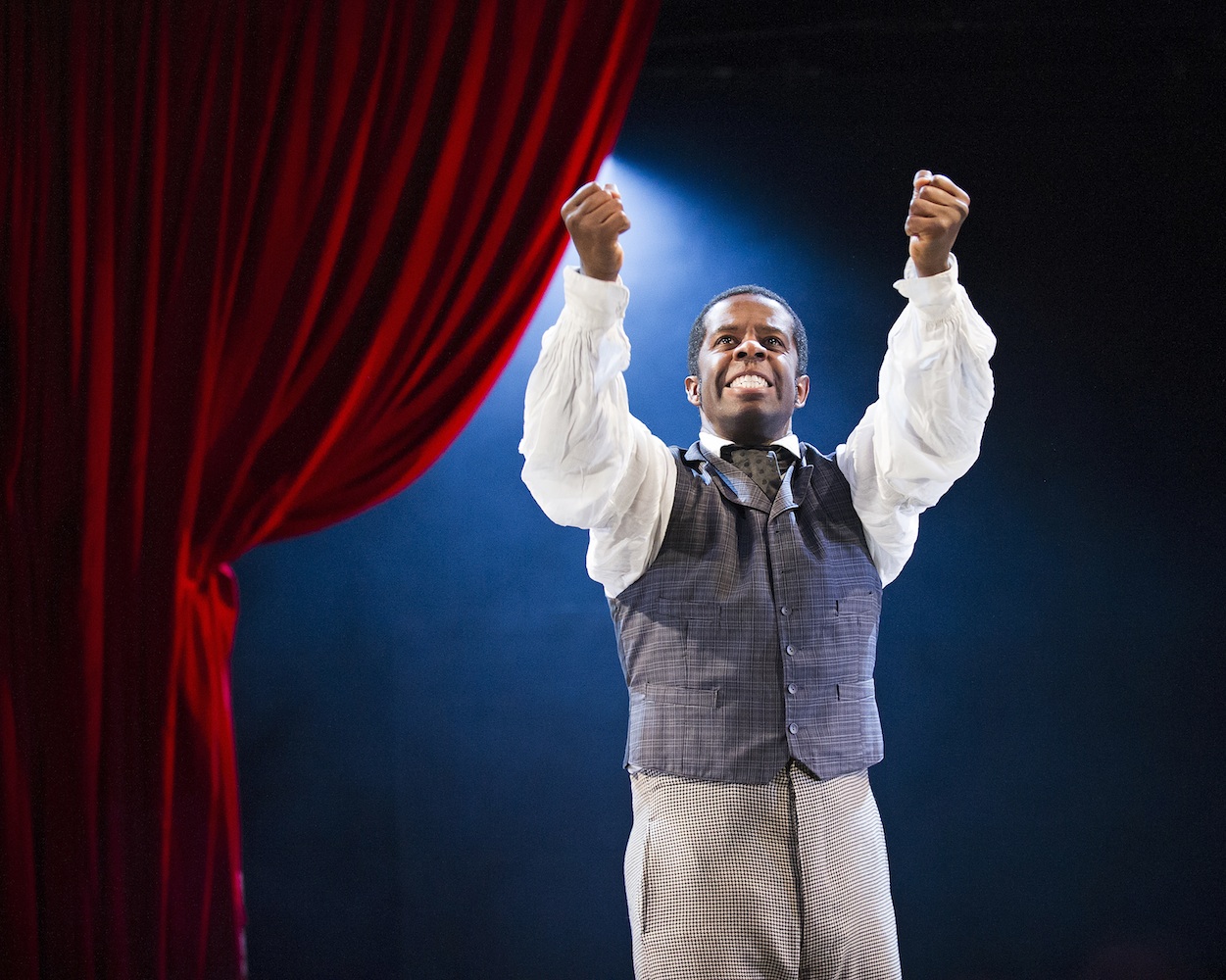Othello, 1833

ABOVE: ADRIAN LESTER AS IRA ALDRIDGE IN RED VELVET. PHOTO COURTESY OF TRISTRAM KENTON.
In 1824, actor Ira Aldridge left the United States. He never returned. Instead, Aldridge spent his 43-year-career touring Europe and making his way through the canon of Shakespeare. He played Richard the III and Macbeth in Serbia, Shylock in the Netherlands, King Lear in Poland, and Othello in London and Belfast, among many other locations. He was awarded a Gold Medal of the First Class for Art and Science in Prussia, The Grand Cross of the Order of Leopold in Austria, and the White Cross in Switzerland. He was welcomed as an honorary member of the Hungarian Dramatic Conservatoire and the Imperial Academy of the Beaux Arts in St. Petersburg. When Aldridge died while acting in Poland, he was granted a state funeral. It was a remarkable career for any actor, but what makes it all the more so is that Ira Aldridge was black. While he was on stage in London, parliament was debating the Abolition of Slavery Act. When he was granted British citizenship, the Civil War was in full swing in the U.S.
Written by Lolita Chakrabarti, and starring Chakrabarti’s husband, the British actor Adrian Lester as Aldridge, Red Velvet focuses on two pivotal moments in the extraordinary actor’s life: his last few days in Poland in 1867, and what he believes to be his big break: his major-stage debut as Othello in London in 1833. As Aldridge, Lester is passionate, persistent, and sincere. Lester easily slips between Aldridge’s booming, British theater voice, his native New York accent, and what he describes as “the more Midwestern sort of refined accent he uses with the company,” as Aldridge is antagonized by his peers. “He’s more New York when he’s getting upset,” explains Lester over the phone. “The New York accent is really noticeable on certain sounds, like ‘off,’ and ‘York,’ ‘floor,’ ‘tall’—those kind of words—so when I found that vowel sound, I was very specific and made sure that it sounded much more New York in tone.”
Red Velvet began its run at the Tricycle Theatre in London, and is now at St. Ann’s in Brooklyn, New York—Aldridge’s hometown—for a limited engagement. It is easy to assume that Chakrabarti tailored the role of Aldridge for her husband, but, while she may have had him in mind, Lester insists that he “fit himself” to the role. “People have dismissed the writing process while they think, ‘Oh, she wrote it for him,'” he tells us. “It is a great part for an actor—a really cool part, and being given the opportunity to do it is a real blessing,” he continues. “Any other actor that comes across this role in the future and gets the chance to play it, they’re going to have a whale of a time. The accents shifting, the mannerisms, the 19th century style of acting, the modern scene that this person gets with Pierre. The part has so many layers and takes such energy.”
EMMA BROWN: I wanted to ask you the obvious question first: do you feel like moving to New York has changed the play in any way?
ADRIAN LESTER: There’s always a subtle shift that happens in any play I’ve done that’s come to New York, or that’s toured, even. The audiences pick up on very much the same things as the London audiences, but there are subtle differences and shifts. It’s still very much the same production we did in London, but it’s a slightly wider space, and we’ve changed the blocking to accommodate that. In London, in many ways, Ira was the foreigner. And the English actors were very much examples of upper class or upper crust English actors in London, so there was an affinity with their manner and their language and their way of being and everything like that. Whereas here, they’re the foreigners. I’ve been able to be much freer and quicker with my dialogue and they’ve had to just be a little clearer with how they’re speaking.
BROWN: Ellen Tree, one of Ira’s co-stars in Othello, explains why she wants to read the play’s reviews, even if they are bad, because, “If we’re underperforming, we should know about it.” Do you feel that way when you’re in a play? Do you want to know and care about what people thing?
LESTER: You’re offering a service, a product to the public. So you’ve got to care whether the public wants to come along and see it, and if it’s a full theater and if people are enjoying themselves. One thing that Ellen also said is, “We should find out what the public thinks.” But actually it’s the writings of one person that she’s saying that about. It’s not the public; it’s one person who’s speaking to the public on behalf of the public. So it’s a strange thing. But I do think that sometimes actors can divorce themselves from the nature of the job, and that is to perform for a paying audience. And then you can go the other way, where actors just basically want to make the audience look at them, and don’t really care what material they’re involved in showing. So we try to strike a balance between the two and show actors who care about the material, think that they’re pursuing an art form, but also really care about what the public thinks.
BROWN: Does a bad review kill a show?
LESTER: Depends what review. I’ve been in shows that have had bad reviews and they’ve gone on and sold out and own awards.
BROWN: Do you think Ira’s life story is a tragedy?
LESTER: I think the only tragedy is that we don’t know more about him, and he isn’t celebrated more for his achievements. People know about him a little more in New York, in America, than they do in London. But actually it’s strange that people don’t know about his European journey, they don’t know about his life, his time in Russia, who he met, where he played. That has all been lost in time, really. That’s the tragedy. And it’s that sense of not being recognized for posterity that Lolita has written into the play and given it its sense of tragedy because of that.
BROWN: I found the moment Ira tears up the letter that he’s written to his father very heartbreaking. That’s when I felt like his story was a tragedy.
LESTER: What happens to him is tragic. Him losing the job—the dream of the job—staining his reputation, and doing a bit more work in the provinces and then thinking “I can’t do this anymore.” [But] then he left and toured Europe, and then he found some acceptance. But the one thing about him is that—and Lolita has written this into the play—he did not take no for an answer. He kept pushing and kept thinking, “There’s another way.” People wrote terrible things [about his performances]. There were a few reviewers who were determined to make sure he never worked again; the idea of a black man doing what he did was just abhorrent to them. They would write terrible reviews about him wherever he appeared, whatever he did. He was mimicked and mocked publicly by another actor who pretended to be a Negro trying to do Shakespeare—and that’s how this other actor made his name, by trying to do that. So it was quite a powerful campaign against him and everything he tried to do. We don’t show all of that in the play, but we show enough to show that he was tenacious and strong and talented and did not give up.
BROWN: The way you interpret Ira, do you think he’s a good actor?
LESTER: Yeah, he’s a very good actor. Ira’s style of acting is very different than my style of acting. It comes from the same root, but in performance, it’s a different style. His was stylized, whereas our modern sense of acting isn’t.
BROWN: Do you think there’s any merit to that sort of stylized style of acting? Do you think it would ever return to fashion?
LESTER: I don’t think so. We want reality now. Our sensibilities have shifted.
BROWN: I know that since your first started Red Velvet, you’ve also played Othello. Did Red Velvet influence your interpretation of Othello at all?
LESTER: Yeah, I suppose that getting practice in the grander style of acting—filling all of those emotional moments with larger voice, larger gesture, larger body movement, and yet trying to keep them real—that really helped me when I was playing Othello. Because I wasn’t really used to expanding an emotional range and making it so classical and big before. I always tried to naturalize it and make it real—much more everyday modern. Playing the 19th century style taught me, in a way, to exercise my thoughts that would help me climb up and reach the large emotions by being big myself. And when I came to play Othello, I realized I didn’t have to try and naturalize everything and bring it down. I could actually climb up and be big and it would still carry in that theater. So that helped.
BROWN: The timeline given out by St. Ann’s states that the first black British actor to play Othello onstage in London was Ray Fearon in 1999. That’s an extraordinarily long time after Aldridge, who you think of as this boundary breaker.
LESTER: In 1989 people were still blacking up to play the part. The reason why black actors didn’t play the role is because if the theater wanted an actor to play Othello in 1934, 1964, 1974—years after Ira—they simply got the best white actor around and he blacked up and played it. And so that practice began to ease out in the late ’70s in Britain. And by 1989, when I think the last actor did it, people started to put lighter and lighter makeup on. And by the time we got to 1999 it became obsolete. And it now looks ridiculous.
BROWN: What’s your earliest memory?
LESTER: My earliest memory is a photograph, actually. I saw it and realized I remembered it being taken. I was about three, maybe four, and I’m in Birmingham, in England, standing outside the house that my family lived in. I remember feeling quite proud. It’s weird the way your memory works, but I remember that it was hot, and I was feeling quite proud because I felt like I was wearing my best clothes and I was standing there being really cool and strong and looking really nice and doing what I was told. I look at the photo, and there’s this tiny little child who’s just stopped toddling in a tank top with a nice new haircut and socks pulled up right and shoes polished. And that was me. But my memory of it is me feeling quite proud of how I looked and standing straight. I’m just a kid. A tiny kid.
BROWN: Did you come from a family where wanting to be an actor was an acceptable goal?
LESTER: My family’s goal, really, was to make sure you worked hard and got paid for the job you were doing and that you could keep the job going and keep the money coming in. By the time I was 14, I started getting paid for my work as an actor. For walk on work as well, because I had an equity card. By then, my family accepted what I was going to do as a really sensible and viable option.
BROWN: Is there a particular role that you haven’t gotten to play that you would have liked to?
LESTER: At one point I wanted to be able to play Romeo, but I’m too old for Romeo. But the only part I kind of feel like I passed by is Romeo. Other parts that I want to play are kind of for when I get older. But one day I’d love to do Sweeney Todd when I’m older.
BROWN: For Ira, he believes that playing Othello at Covent Garden is his big break. What was that moment for you?
LESTER: I suppose for me [there have been] a couple of breaks I’ve had that led to really good things. One was doing As You Like It with Cheek by Jowl. That was a big break for me on the stage. And there was another huge break, when I got Primary Colors and played that part in the film for Mike Nichols. Then there was another break after that, when I got the part of Mickey Stone in [the television series] Hustle.
BROWN: Have you ever had a false big break like Ira?
LESTER: Well, I suppose Primary Colors was a false big break. I got that part in ’97 and came over and played the role and I stayed in America for a bit afterwards, thinking “things are going to happen and people will see it and think I’m worth employing or having to read” and it didn’t happen. I met so many people, and they had absolutely no work for me at that stage. The kind of character that I portrayed or any kind of character that was a leading role at that time just wasn’t wanted, or wasn’t warranted. So I went home and did more theatre work.
BROWN: Why do you think that was?
LESTER: There weren’t the parts. And of the parts that were around, I remember sitting with Costa-Gavras who wanted to do a film called No Other Life. I sat with Sidney Lumet who wanted to do Twelve Angry Men, but both directors just couldn’t raise the money for their films. It was different time and they just couldn’t find the money and I wasn’t getting the work and I just went home.
BROWN: What is the thing that meant the most to you that someone said about one of your performances?
LESTER: I remember being in France, at the Bouffes Du Nor, and we’d just done a matinee of Hamlet. The audience was quite quiet, and it was a very difficult role. I was tired and I knew had another show to do, and you spend all that time talking about death and loneliness and love and lost love and trust and friendship. I came into the café bar, we were going to have a quick bite to eat before we went downstairs and prepared to do the show again. As we sat waiting, a woman who was on her way out of the café bar and stopped beside my table and she said, “Thank you for your performance.” And I said “Thank you very much.” And she said, “It’s strange, isn’t it?” And I was looking at her thinking, “What do you mean?” She was quite old, quite artistic—I could tell by her clothing—and quite well-to-do. She said, “Sometimes when things happen, you feel that there’s no point and you shouldn’t bother.” She wasn’t even talking to me now; she was looking into the distance, really speaking to herself. And then she said, “Sometimes you see something that reminds you that actually no one’s having an easy time and it’s just worth carrying on. Day by day.” And then she looked at me again and said, “Isn’t that right?” And I said, “I think so.” I don’t know what it meant to her, I don’t know what she was referring to, but something told me that it was more than just a play for her. And that’s always stayed with me.
RED VELVET WILL RUN AT ST. ANN’S WAREHOUSE IN BROOKLYN THROUGH APRIL 20. FOR MORE INFORMATION, OR TO PURCHASE TICKETS, VISIT THE THEATER WEBSITE.






